#Thomas Francis Meagher
Explore tagged Tumblr posts
Text
Kilmainham Gaol
Kilmainham Gaol is one of the largest unoccupied gaols in Europe, covering some of the most heroic and tragic events in Ireland’s emergence as a modern nation from the 1780s to the 1920s. Attractions include a major exhibition detailing the political and penal history of the prison and its restoration. Located approximately two miles outside of Dublin city centre, it was built as a county gaol to…
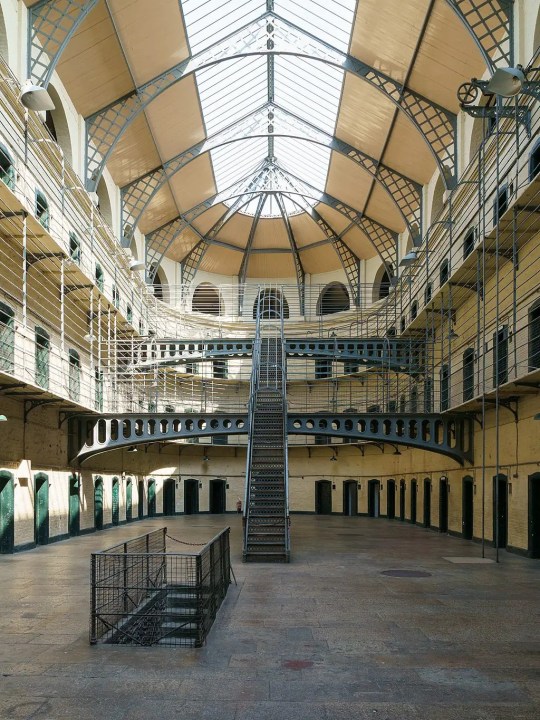
View On WordPress
#1798 United Irishmen Rebellion#1916 Easter Rising#Dublin#History#History of Ireland#Ireland#Irish Civil War#Irish History#Irish War of Independence#Kilmainham Courthouse#Kilmainham Gaol#Office of Public Works#OPW#Thomas Francis Meagher
27 notes
·
View notes
Text

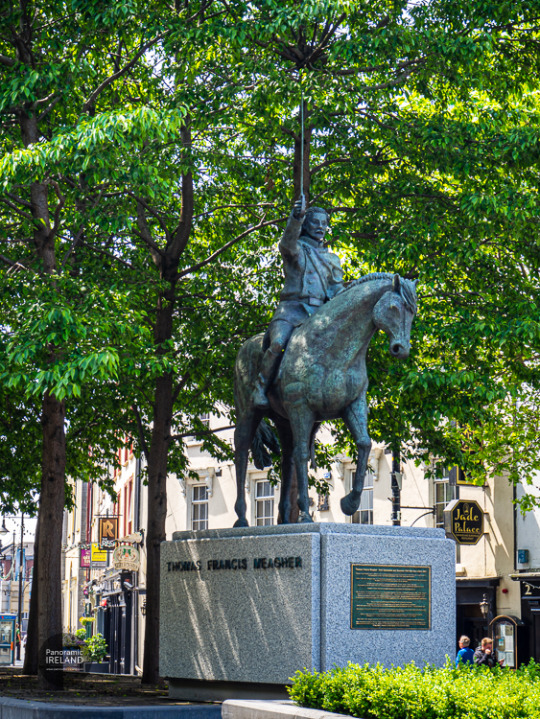
This week 175 years ago, back in 1848, the Irish flag was first unveiled and hoisted on the Mall in Waterford, Ireland.
Created by Thomas Francis Meagher a skilled orator and statesman who later went on to become the first acting governor of Montana.
Often represented as green, white and gold the Irish flag is in fact green, white and orange - in Meagher's own words: "The white in the centre signifies a lasting truce between the 'Orange' and the 'Green', and I trust that beneath its folds the hands of the Irish Protestant and the Irish Catholic may be clasped in generous and heroic brotherhood."
The 7th of March 2023 marks 175 years since the Irish flag was first flown.
#ireland#irish#irish flag#vsco#travel#ireland travel#thomas francis meagher#irish tricolour#green white and orange#vscocam#photography#photographers on tumblr#waterford#history#panoramic ireland
70 notes
·
View notes
Text
April 24, 2023: Rep Zooey Zephyr, Montana State Democratic Representative who just happens to be a Transgender Woman has been Forbidden from Participating in Debates by republican-confederate maga loyalist for 3 Days in a row
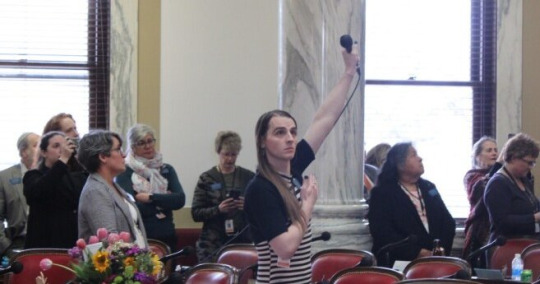
This is not simply R-CML talking over Her or ignoring Her
The R-CML Voted for a 3rd Time to Continue Subjecting Zephyr to a Gag Order, Denying Her the chance To Speak.
But
This time Her Supporters were there and They Started Chanting “Let Her Speak!” from the Gallery.
It's important to note Her Supporters Who Were There, Were the PEOPLE of Montana who just Elected Her to Represent Them, Not Only in D.C., but also In Montana.
The republican-confederate maga loyalist Led House Denied PEOPLE OF MONTANA THEIR VOICE!!!

One CBS reporter wrote the PEOPLE'S Voices Were "Forcing legislative leaders [R-CML] to pause proceedings and clear the room."
But
Were the PEOPLE the cause, or was it a Group of FASCIST Silencing the Voices of PEOPLE Who Disagree With Them?
The PEOPLE Came to the House Peacefully, to Hear Their Representative Speak on Matters Important to Them.
The Democratic Way, Would've Been to Hear the Voice of the PEOPLE, Not to Send Armed Law Enforcement to Force The PEOPLE Out and Silence Their Voices
But
The R-CML Did Send Armed Law Enforcement To the Gallery Above the House Floor to Force Out PEOPLE Standing and Chanting "LET HER SPEAK"

Seven, 7 PEOPLE Who Disagreed With the R-CML were Arrested for Criminal Trespass, Criminal Trespass For Chanting.

Sheriff Leo C. Dutton said. The PEOPLE Arrested were going to be booked and released.
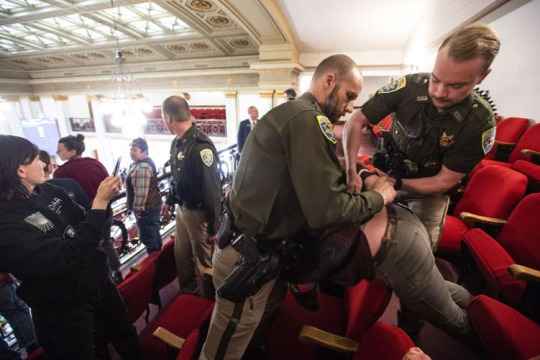
Before the House Session began there was a Peaceful Rally to Show Support for Rep Zooey Zephyr

The Capital Statue behind Her Supporter is Interesting to me, because it's depicting Union Brigadier General Thomas Francis Meagher, an Irish Immigrant who was a Famous Revolutionary in Ireland and a Loyal United States Citizen During The Civil War.
January 1847: Meagher, John Mitchel, William Smith O'Brien, and Thomas Devin Reilly formed The Irish Confederation.
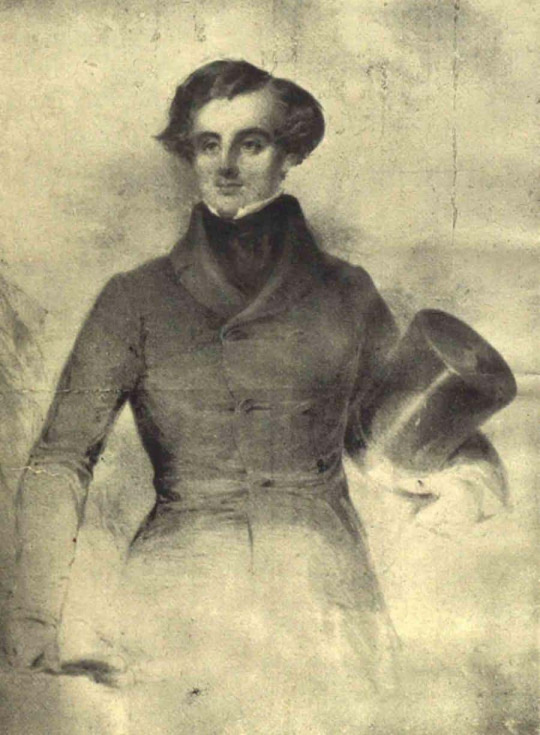
The Irish Confederation was for a National Parliament with Full Legislative and Executive Powers. The Founding was based on Principles of Freedom, Tolerance and Truth
Their goal was Independence for the Irish Nation from Britain and they held to any means to achieve that which were consistent with Honor, Morality and Reason.
July 1848: After a failed Rebellion that end The Irish Confederation Meagher Escaped, Came to the U.S. and Became a U.S. Citizen
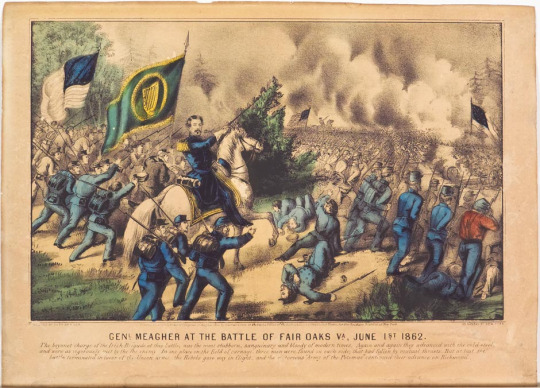
His Reason Given for Loyalty to the United States During the Civil War...
"It is not only our duty to America, but also to Ireland. We Could Not Hope to Succeed in our effort To Make Ireland a Republic Without the Moral and Material Support of the Liberty-Loving Citizens Of These United States."
Meagher had supported the South, but disagreed over the issue of slavery.
The republican-confederate maga loyalist seem to have Nothing I Common With Thomas Francis Meagher

`1/
"Montana transgender lawmaker silenced again, backers protest"
"Montana transgender lawmaker silenced for third day; protesters interrupt House proceedings"
"Thomas Francis Meagher"
"Union Brigadier General/Politician Thomas Francis Meagher"
#human rights#transgender rights#Women's Rights#Rep Zooey Zephyr#United States of America#republican-confederate maga loyalist#republican traitors
3 notes
·
View notes
Text
On this day in Wikipedia: Thursday, 3rd August
Welcome, नमस्ते, שלום, こんにちは 🤗 What does @Wikipedia say about 3rd August through the years 🏛️📜🗓️?

3rd August 2022 🗓️ : Death - Jackie Walorski Jackie Walorski, American politician (b. 1963) "Jacqueline Renae Walorski (, August 17, 1963 – August 3, 2022) was an American politician who served as the U.S. representative for Indiana's 2nd congressional district from 2013 until her death in 2022. She was a member of the Republican Party. Walorski served in the Indiana House of..."

Image by Franmarie Metzler, House Creative Services
3rd August 2018 🗓️ : Event - August 3 Two burka-clad men kill 29 people and injure more than 80 in a suicide attack on a Shia mosque in eastern Afghanistan. "August 3 is the 215th day of the year (216th in leap years) in the Gregorian calendar; 150 days remain until the end of the year. ..."
3rd August 2013 🗓️ : Death - Jack Hightower Jack English Hightower, American lawyer and politician (b. 1926) "Jack English Hightower (September 6, 1926 – August 3, 2013) was a former Democratic U.S. representative from Texas's 13th congressional district...."
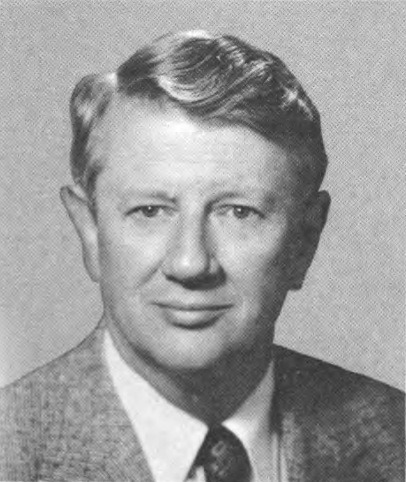
Image by US Government Printing Office
3rd August 1973 🗓️ : Birth - Michael Ealy Michael Ealy, American actor "Michael Brown (born August 3, 1973), professionally known as Michael Ealy, is an American actor. He is known for his roles in Barbershop (2002), 2 Fast 2 Furious (2003), Takers (2010), Think Like a Man (2012), About Last Night (2014), Think Like a Man Too (2014), The Perfect Guy (2015), and The..."

Image licensed under CC BY 3.0? by Adweek
3rd August 1923 🗓️ : Birth - Pope Shenouda III of Alexandria Pope Shenouda III of Alexandria (d. 2012) "Pope Shenouda III (Egyptian Arabic pronunciation: [ʃeˈnuːdæ]; Coptic: Ⲡⲁⲡⲁ Ⲁⲃⲃⲁ Ϣⲉⲛⲟⲩϯ ⲅ̅ Papa Abba Šenoude pimah šoumt; Arabic: بابا الإسكندرية شنودة الثالث Bābā al-Iskandarīyah Shinūdah al-Thālith; 3 August 1923 – 17 March 2012) was the 117th Pope of Alexandria and Patriarch of the See of St...."
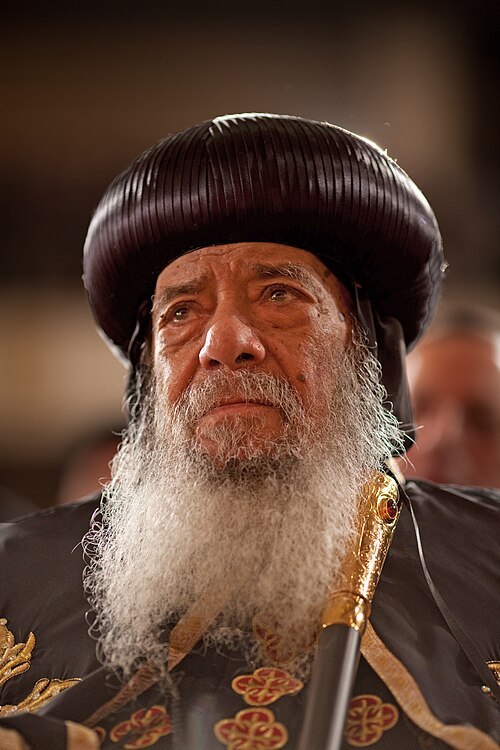
Image by Chuck Kennedy
3rd August 1823 🗓️ : Birth - Thomas Francis Meagher Thomas Francis Meagher, Irish-American revolutionary and military leader, territorial governor of Montana (d. 1867) "Thomas Francis Meagher ( MARR; 3 August 1823 – 1 July 1867) was an Irish nationalist and leader of the Young Irelanders in the Rebellion of 1848. After being convicted of sedition, he was first sentenced to death, but received transportation for life to Van Diemen's Land (now Tasmania) in..."
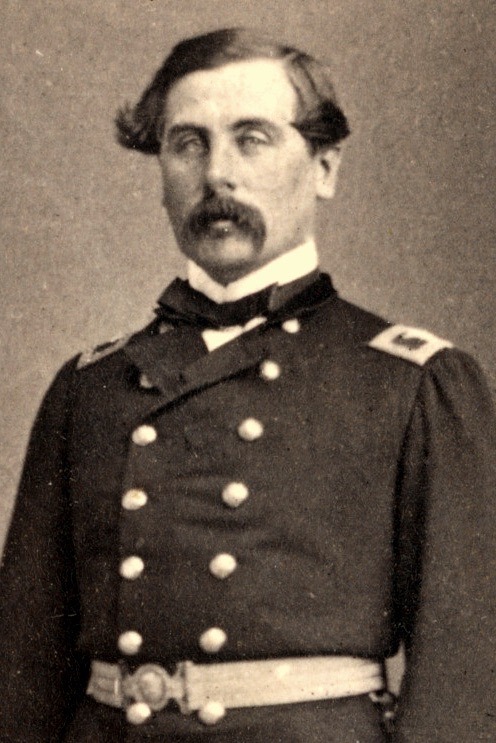
Image by Mathew B. Brady, circa 1823- 15 Jan 1896
3rd August 🗓️ : Holiday - Christian feast day: Stephen (Discovery of the relic) "Stephen (Greek: Στέφανος Stéphanos, meaning "wreath or crown" and by extension "reward, honor, renown, fame", often given as a title rather than as a name; c. 5 – c. 34 CE) is traditionally venerated as the protomartyr or first martyr of Christianity. According to the Acts of the Apostles, he was a..."

Image by Carlo Crivelli
0 notes
Text
Thomas Francis Meagher - Wikipedia
Hey here is the Wikipedia article to the guy I mentioned who was partly my inspiration for the character I just posted.
0 notes
Text
Cork Lifelong Learning Festival | Mayfield Library

The Cork Lifelong Learning Festival was back with a bang this year with over 300 amazing events with approximately one third of these being hosted by your local library service!
Today we take a brief look at a number of the events organised by Mayfield library for this years festival.
“Rebels, Writers & Merchants” was a heritage walk conducted from Mayfield Library by Brendan Goggin for the Lifelong Learning Festival on Saturday, April 1st. Brendan led 50 local history aficionados along a trail encompassing Ashburton, Gardiner’s Hill, Ardnalaoi and finishing up at the Montenotte Hotel. Along the way listeners were enthralled by the exploits of local Republicans a hundred years ago, the life and times of Daniel Corkery and the pioneering ideas of John Holland on submarine engineering.
In the modern Ardnalaoi housing estate they saw the incorporated high walls of what was once the estate of the Quaker merchant family, the Carrolls. The walk finished up at the Montenotte Hotel which very generously provided tea and pastries to assist in continuing historical discussion and aid the recovery of tired legs. It was here Thomas Francis Meagher, Waterford, would visit the residence of his young Murphy friends (the distilling family) and, replete with revolutionary ideas from Paris 1848, outline his design for the tricolour that eventually became our national flag.
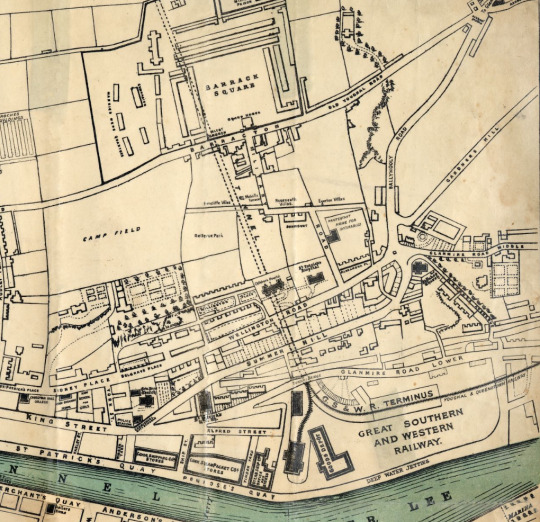
The Mayfield Lifelong Learning Expo returned this year and was held at the Mayfield Sports Complex on Wednesday, March 29th. The event was officially opened by Lord Mayor Deirdre Forde, who wished all the day’s participants continued success. EXPO 2023 showcased the activities run by the Mayfield Learning Neighbourhood and a whole host of social, community, educational and service providers in the area. All came together on the day to organise and promote learning and lifelong participation in learning. Mayfield Library’s stand was tended in rotation by branch staff and experienced a high level of engagement with local schools, local organisations and the general public.
Staff were kept busy throughout the day explaining library services and how they can be accessed. Combining on-the-spot tutoring and support literature, the public learned about downloadable book borrowing (BorrowBox), digital magazine access (Libby), languages and hobbies (Universal Class) as well as the more traditional library materials and activities available within the branch. Particularly fascinating to some was learning that Ireland’s public libraries are now linked up and taking membership with one allows use of all.
1 note
·
View note
Photo

Flag of Ireland
Aspect Ratio 1:2
The flag of Ireland was adopted in 1922. The colors of green and orange had historically been rivaling colors associated with Irish revolution. Green had been the color of the United Irishmen organization, founded after the French revolution in the 1790's. A rival organization, the Orange Order was founded around the same time, exclusively for Protestants. During the 19th century, younger Irish nationalists sought to establish a peace between the two traditions and establish a self-governing Ireland. The colors, combined with white for peace, were joined in cockades during 1830, which in turn inspired the Irish flag, created in 1848. This flag was created by a group of French women who sympathized with the Irish cause, hence it's similarities to the French tricolor. The flag was presented as a gift to Irish revolutionary Thomas Francis Meagher of the Young Ireland movement. During the Irish War of Independence (1919-1921) the flag was adopted by the Irish Republic. The resulting Irish Free State continued it's use. The design of the flag is similar to that of the flag of the Ivory Coast, though the color sequence is reversed and the proportions are different.
x.x.x.x.x.
4 notes
·
View notes
Photo
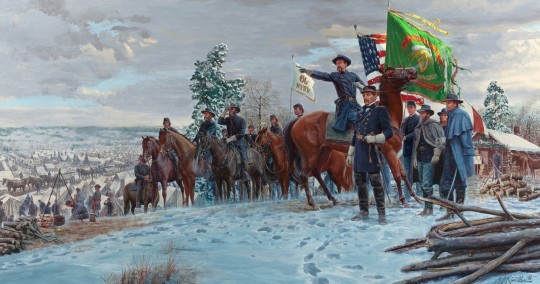

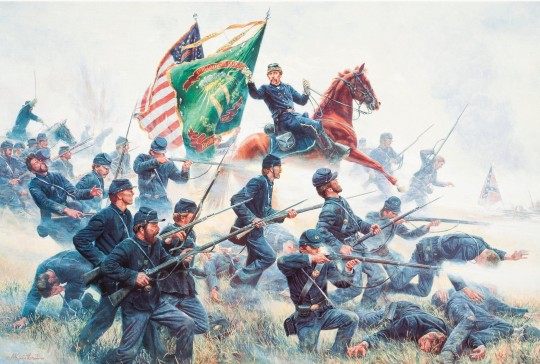
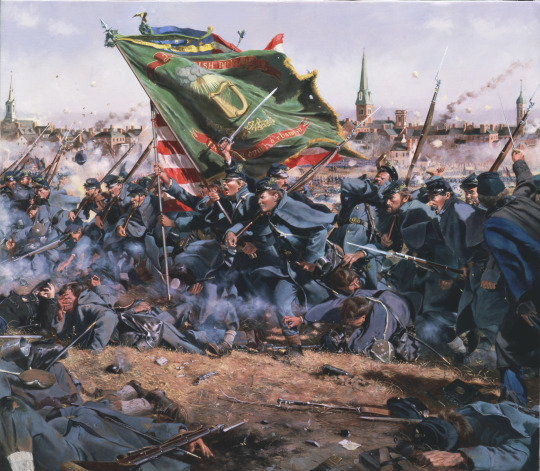
Organized in 1861 shortly after First Bull Run, The Irish Brigade’s nucleus was the 63d, 69th, and 88th New York Infantry. In the fall of 1862 the 28th Massachusetts and the 116th Pennsylvania were added, and the 29th Massachusetts served with it for a short time. It saw action in the Peninsular Campaign, at Antietam, Second Bull Run, Fredericksburg, Chancellorsville, Gettysburg, Cedar Run, The Wilderness, Spotsylvania Court House, Cold Harbor, and Petersburg, in the 1st Division of the II Corps. Reorganized in November 1864, with the 7th New York Heavy Artillery replacing the 116th Pennsylvania, it was by then no longer the old organization and certainly could not be truthfully designated the Irish Brigade. It had suffered over 4,000 casualties in killed and wounded, a total which exceeded the number of men enrolled in it at any given time.
Of the five men who commanded the Irish Brigade, three were killed and the other two wounded. Colonel Richard Byrne was mortally wounded at Cold Harbor; Colonel Patrick Kelly was killed at Petersburg; Major General Thomas A. Smyth died at Farmville; and Brigadier Generals Robert Nugent and Thomas Meagher were both wounded.
The most colorful and flamboyant of its leaders was the original commander and organizer, General Thomas Francis Meagher. Born in County Waterford, Ireland in 1823, he was described as ‘the counterpart of some rash, impolitic, poetic personage from Irish poetry or fiction.’ Son of a wealthy merchant, he was an active disciple of Irish liberty and participated in the various independence movements. In 1845 the British exiled him to Tasmania. Three years later he escaped and eventually made his way to New York City. At various times a lawyer, lecturer, newspaper editor, and politician, his flaming oratory had made him a favorite of the ‘Young Ireland’ group and he soon became the political leader of the Irish element in New York. At the outbreak of the Civil War he raised a Zouave company and commanded it at First Bull Run as part of the 69th New York State Militia. That winter he organized the Irish Brigade and President Lincoln appointed him brigadier general of Volunteers in February 1862. (x)
The Fighting 69th by Mort Kunstler (x)
Fight’n Irish by Dale Gallon (x)
Raise the Colors and Follow Me! by Mort Kunstler (x)
Clear the Way by Don Troiani (x)
#american civil war#us civil war#mort künstler#dale gallon#don troiani#history#acw#i'd recommend the article i linked cause it's really good#i was thinking of maybe just posting and meagher but i like a lot of paintings that include the irish brigade#so i thought it was a good time today lol
67 notes
·
View notes
Quote
In this Ireland, the English shall never, never had rest. Until that government be thoroughly upset, I shall not cease to write, to speak, to act.
Thomas Francis Meagher, Irish patriot, future Union Army general.
4 notes
·
View notes
Text
#OTD in 1848 – The tricolour national flag of Ireland was presented to the public for the first time by Thomas Francis Meagher and the Young Ireland Party, in Dublin.
In 1848, Thomas Meagher and William Smith O’Brien went to France to study revolutionary events, and returned to Ireland with the new Flag of Ireland, a tricolour of green, white and orange made and given to them by French women sympathetic to the Irish cause. The acquisition of the flag is commemorated at the 1848 Flag Monument in the Irish parliament. This flag was first flown in public on 1…
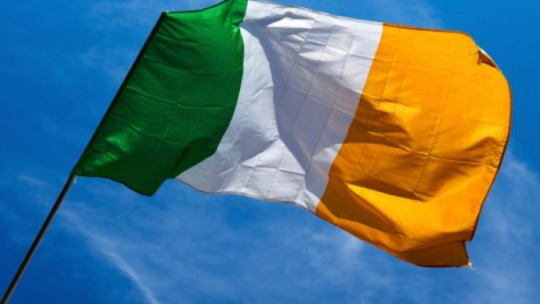
View On WordPress
#Catholic#Dublin#France#Green#Ireland#Irish History#Irish Tricolour#Orange#Protestant#Thomas Francis Meagher#Waterford#White#Young Irelander Party
14 notes
·
View notes
Link
Ireland's flag of green, white and orange was first flown in Waterford March 7th 1848 by Thomas Francis Meagher. A flag still flies at 33 The Mall today.
#ireland#waterford#vsco#travel#thomas francis meagher#montana#young irelanders#irish flag#irish tricolour#1848 in ireland#green white and orange#panoramic ireland
13 notes
·
View notes
Photo

Thomas Francis Meagher, Ehrgott & Forbriger Lithography Company, c. 1862-1864, Smithsonian: National Portrait Gallery
Size: Image: 34 × 24.3 cm (13 3/8 × 9 9/16") Medium: Lithograph on paper
https://npg.si.edu/object/npg_NPG.99.126.14
2 notes
·
View notes
Text
He became the son of Calpornius
who served as the deacon of the metropolis of Bannavern Taburniae. St. Patrick got here from a rich circle of relatives so he by no means had struggles while developing up. In fact, the young St. Patrick grew up to be a wild Youngman, who "did now not recognize the proper God."
He grew up looking to be unbiased and oftentimes wandered far from the group. This made him an easy target of Irish pirates and resulted to his abduction wherein turned into introduced to Ireland. Study in Ireland It changed into in Ireland wherein St. Patrick remained as captive for a duration of six years. During that time, slavery turned into common and human rights had been never heard of. Hence, St. Patrick experienced heavy exertions being a slave. He survived the tough life he had in Ireland with the aid of turning to religion.
St. Patrick worked as a shepherd for his Master and most of his solitude time became spent wondering that his past mistakes lead him to come to be a slave consequently he needed repentance. He quickly learned to say hundred of prayers every morning and every night.
He was capable of get away Ireland and went lower back to his homeland. St. Patrick then determined to emerge as a clergyman and studied in France. After becoming a clergyman, he heard a voice telling him to go returned to Ireland. The subsequent 30 years of his lifestyles changed into spent in Ireland where he helped in constructing several churches, monasteries, and faculties in Ireland. He died on March 17 461, that's now being celebrated as St. Patrick's Day, a country wide vacation in Ireland.
Thomas Francis Meagher become born in 1823 in Waterford, Ireland. He turned into knowledgeable at Clongowes Wood College, Co. Kildare and Stoneyhurst College, Lancashire, England. In 1844 he moved to Dublin with the aim of studying for the bar however he instead have become involved in Daniel O'Connell's Repeal Association. With his eloquent oration he became a famous parent in Dublin, his speeches ensured crowded halls wherever he went.
Meagher and different individuals of the Repeal Association who wrote for The Nation became called the Young Irelanders. In January 1847, Meagher, collectively with John Mitchel, William Smith O'Brien and Thomas Devin O'Reilly shaped a brand new repeal association referred to as the Irish Confederation. The following year, Meagher and O'Brien went to France to have a look at progressive occasions there and they back with the tricolour of green, white and gold which forms the basis of the Irish flag to the prevailing day. Influenced by means of events in France and the suspension of habeas corpus in Ireland, the Young Irelanders organised a failed rebellion. Meagher, Terence MacManus, O'Brien and Patrick O'Donoghue have been arrested, tried, convicted and sentenced to be hung, drawn and quartered. However because of public and international pressure the sentences had been commuted to transportation to Van Diemens Land, Tasmania, Australia. Meagher escaped to america in 1852, settling in New York City where he founded two newspapers the Irish News and the Citizen.
At the outbreak of the American Civil War, Meagher joined the Union Army, recruiting a full company of infantrymen to be connected to the 69th U.S. Infantry Regiment. Meagher become appointed Major and led the regiment into their first engagement on the First Battle of Bull Run in which he was wounded. He again to New York and fashioned the Irish Brigade which he led with the rank of brigadier general inside the Peninsula Campaign of 1862. After the struggle Meagher became appointed as Governor of the new Territory of Montana. In the summer season of 1867, even as journeying at the Missouri River, Meagher fell overboard, his body turned into in no way recovered. There is a first-class statue of Meagher on horseback with sword raised in his domestic metropolis of Waterford, Ireland.
1 note
·
View note
Text
On the twenty-first of July, beneath the burning sun. McDowell met the Southern troops in battle, at Bull Run; Above the Union vanguard, was proudly dancing seen, Beside the starry banner, old Erin's flag of green.Colonel Corcoran led the Sixty-ninth on that eventful day, I wish the Prince of Wales were there to see him in the fray; His charge upon the batteries was a most glorious scene, With gallant New York firemen, and the boys that wore the green.In the hottest of the fire there rode along the line A captain of a Zouave band, crying, "Now, boys, is your time;" Ah! who is he so proudly rides, with bold and dauntless mien? 'Tis Thomas Francis Meagher, of Erin's isle of green!The colors of the Sixty-ninth, I say it without shame, Were taken in the struggle to swell the victor's fame; But Farnham's dashing Zouaves, that run with the machine, Retook them in a moment, with the boys that wore the green!Being overpowered by numbers, our troops were forced to flee, The Southern black horse cavalry on them charged furiously; But in that hour of peril, the flying mass to screen, Stood the gallant New York firemen, with the boys that wore the green.Oh, the boys of the Sixty-ninth, they are a gallant band, Bolder never drew a sword for their adopted land; Amongst the fallen heroes, a braver had not been, Than you lamented Haggerty, of Erin's isle of green.Farewell, my gallant countrymen, who fell that fatal day, Farewell, ye noble firemen, now mouldering in the clay; Whilst blooms the leafy shamrock, whilst runs the old machine, Your deeds will live bold Red Shirts, and Boys that Wore the Green! Boys That Wore the Green- David Kincade
1 note
·
View note
Photo

Thomas Francis Meagher – I now bid farewell to… https://ift.tt/2LdXaWU ✪ Get More FANTASTIC Quotes—the Image Will Take You There! 😉
2 notes
·
View notes
Photo

1862 Bull Run - Irish Brigade - Rick Reeves
At the Battle of First Manassas on July 21st, 1861, Captain Thomas Francis Meagher of the 69th New York State Militia had his horse shot from under him by an artillery projectile. Meagher, that day acting as major for the regiment, sprang to his feet and shouted, “Boys! look at that flag–remember Ireland and Fontenoy.” Meagher is shown with his sword in his hand just to the right of the flags. courtesy
37 notes
·
View notes